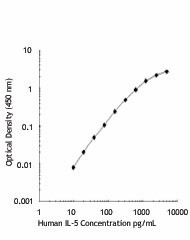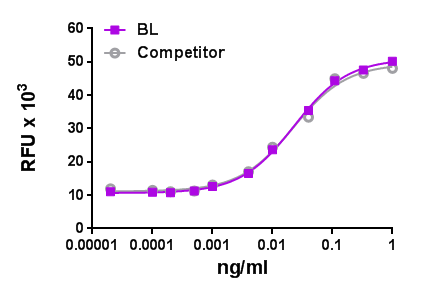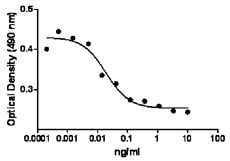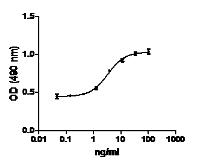- Regulatory Status
- RUO
- Other Names
- Interleukin-5, Eosinophil differentiation factor (EDF), Eosinophil colony stimulating factor (Eo-CSF), B cell growth factor-2 (BCGF-2), B cell differentiation factor for IgM (BCDF-m), IgA enhancing factor (IgA-EF), T cell replacing factor-1 (TRF-1)
- Ave. Rating
- Submit a Review
- Product Citations
- publications

| Cat # | Size | Price | Quantity Check Availability | Save | ||
|---|---|---|---|---|---|---|
| 560701 | 2 µg | $147 | ||||
This product is not available for shipping outside of the United States.
IL-5 is a homodimeric, disulphide-linked protein produced by T-cells. Monomeric human IL-5 is a 126 amino acid protein with a reported molecular weight of 26 kD for the homodimeric protein. Mouse and human IL-5 are approximately 70% identical. IL-5 has been shown to promote the growth of immature hematopoietic BFU-E progenitors, stimulate the activation and differentiation of eosinophils, and promote the generation of cytotoxic lymphocytes.
Product DetailsProduct Details
- Source
- E. coli, approximately 26 kD
- Formulation
- Sterile-filtered through a 0.2 micron filter. Lyophilized with no additives.
- Endotoxin Level
- Less than 0.1 ng per µg of protein.
- Preparation
- Centrifuge vial prior to opening. Reconstitute in 100 µl sterile water for a concentration of 20 µg/ml and mix well. This solution can be diluted into other aqueous buffers containing a carrier protein such as 1% BSA or HSA or 10% FBS. Stock solutions should be prepared at no less than 10 µg/mL in sterile buffer with carrier protein. After reconstitution, the cytokine can be stored at -20°C to -70°C for up to three months.
- Storage & Handling
- Unopened vial can be stored at -20°C or -70°C. For maximum results, quick spin vial prior to opening. Reconstitute in water to a concentration of 0.1-1.0 mg/ml. Do not vortex. It is recommended to further dilute in a buffer containing a carrier protein such as 0.1% BSA and store working aliquots at -20°C to -80°C. Avoid repeated freeze/thaw cycles.
- Application
-
ELISA, Bioassay
- Recommended Usage
-
Each lot of this protein is quality control tested by ELISA assay. For use as an ELISA standard, a standard curve comprised of doubling dilutions from 500 pg/ml to 4 pg/ml is suggested. Please see antibody product data sheets and recommended protocols. It is recommended that the reagent be titrated for optimal performance for each application.
- Application Notes
-
ELISA: This IL-5 protein is useful as a standard for a human IL-5 sandwich ELISA, using unlabeled JES1-39D10 antibody (catalog #500902) for capture and biotinylated JES1-5A10 antibody (catalog #501002) for detection.
Ligand Blocking: This IL-5 protein is useful as a ligand-blocking specificity control for immunohistochemical or immunofluorescent staining.
Bioassay: This IL-5 protein is biologically active, and can be used for in vitro assays. - Product Citations
-
Antigen Details
- Structure
- Cytokine; dimer
- Bioactivity
- Growth/differentiation of eosinophils; proliferation/cell activation/differentiation of eosinophilic granulocytes
- Cell Sources
- Mast cells, T cells, bone marrow stromal cells
- Cell Targets
- Eosinophils
- Receptors
- Heterodimer IL-5Rα (CD125); β-subunit (CDw131) in common with IL-3R, GM-CSFR
- Cell Type
- Embryonic Stem Cells, Hematopoietic stem and progenitors
- Biology Area
- Cell Biology, Immunology, Stem Cells
- Molecular Family
- Cytokines/Chemokines
- Antigen References
-
1. Fitzgerald, K., et al. Eds. 2001. The Cytokine FactsBook. Academic Press, San Diego.
2. Takatsu, K., et al. 1988. Immunol. Rev. 102:107.
3. Takatsu, K. 1992. Curr. Opin. Immunol. 4:299.
4. Takatsu, K. 1991. Microbiol. Immun. 35:593. - Regulation
- Upregulated by IL-2, platelet activating factor; downregulated by TGF-β
- Gene ID
- 3567 View all products for this Gene ID
- UniProt
- View information about IL-5 on UniProt.org
Related FAQs
- Why choose BioLegend recombinant proteins?
-
• Each lot of product is quality-tested for bioactivity as indicated on the data sheet.
• Greater than 95% Purity or higher, tested on every lot of product.
• 100% Satisfaction Guarantee for quality performance, stability, and consistency.
• Ready-to-use liquid format saves time and reduces challenges associated with reconstitution.
• Bulk and customization available. Contact us.
• Learn more about our Recombinant Proteins. - How does the activity of your recombinant proteins compare to competitors?
-
We quality control each and every lot of recombinant protein. Not only do we check its bioactivity, but we also compare it against other commercially available recombinant proteins. We make sure each recombinant protein’s activity is at least as good as or better than the competition’s. In order to provide you with the best possible product, we ensure that our testing process is rigorous and thorough. If you’re curious and eager to make the switch to BioLegend recombinants, contact your sales representative today!
- What is the specific activity or ED50 of my recombinant protein?
-
The specific activity range of the protein is indicated on the product datasheets. Because the exact activity values on a per unit basis can largely fluctuate depending on a number of factors, including the nature of the assay, cell density, age of cells/passage number, culture media used, and end user technique, the specific activity is best defined as a range and we guarantee the specific activity of all our lots will be within the range indicated on the datasheet. Please note this only applies to recombinants labeled for use in bioassays. ELISA standard recombinant proteins are not recommended for bioassay usage as they are not tested for these applications.
- Have your recombinants been tested for stability?
-
Our testing shows that the recombinant proteins are able to withstand room temperature for a week without losing activity. In addition the recombinant proteins were also found to withstand four cycles of freeze and thaw without losing activity.
- Does specific activity of a recombinant protein vary between lots?
-
Specific activity will vary for each lot and for the type of experiment that is done to validate it, but all passed lots will have activity within the established ED50 range for the product and we guarantee that our products will have lot-to-lot consistency. Please conduct an experiment-specific validation to find the optimal ED50 for your system.
- How do you convert activity as an ED50 in ng/ml to a specific activity in Units/mg?
-
Use formula Specific activity (Units/mg) = 10^6/ ED50 (ng/mL)
 Login/Register
Login/Register 















Follow Us